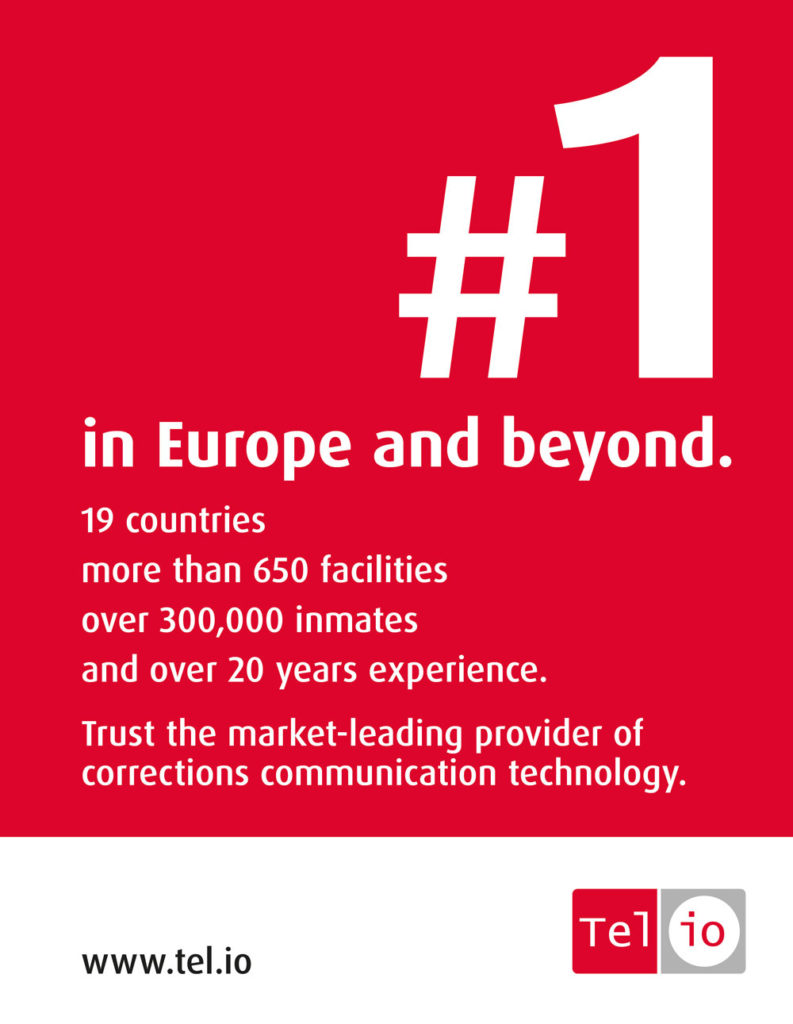In the developed and modern 21st century, the punishment, retribution, security, rehabilitation and restorative dimensions of the prison sentence, cannot be seen as isolated but as intertwined dimensions that will ultimately contribute to transform the individual and reach the goal of its reinsertion back into society. Navigating the waves of opposing discussions in the public space on citizen’s safety – and often contradictory political speeches – correctional services compromise to provide the proper balance of security provisions, evidence-based rehabilitation programmes as well as arranging sustainable transition-to-community and reinsertion partnerships.
Inmate family support and social ties, the social bonds that attach individuals to society, their conventional institutions, values and activities, are essential factors for deterrence of deviant behaviour and recidivism preventing.
While in detention, regular contacts such as in-person visits, telephone and written contact with families, all help to maintain or reinforce vital social support networks. This strengthening of social ties not only prevents individuals in custody from establishing a criminal identity but also provides the individual with the necessary conditions to avoid recidivism on release, namely: family support and housing or financial support. Recent studies conducted in correctional facilities in Florida and Canada suggest that family contact in particular regular visiting is associated with lower recidivism rates[1].
Successful policies and practices around the world contributed to inform the UN Nelson Mandela Standard Minimum Rules for the treatment of inmates[2]. These state (Rule 58) that “Prisoners shall be allowed, under necessary supervision, to communicate with their family and friends at regular intervals: (a) by corresponding in writing and using, where available, telecommunication, electronic, digital and other means; and (b) by receiving visits.”
Also, the recommendations of the International Penal Reform Global Prison Trends 2018[3] reinforce that “states should facilitate contact between prisoners and their family and friends through regular, affordable and easy access to mail, telephones and other communications, as well as through visits in a clean, respectful and safe environment”.
Equally important, as a complement to family action or its absence, is the contact with public institutions and public services. Such services, which have a growing digital presence, support the transition from prison back into society. Proven examples of such services are housing or job search assistance, both fundamental elements to the effective offender reintegration.
With the availability of increasingly smaller, advanced and more feature-rich mobile phones, there have also been more opportunities to smuggle them into a prison setting.
Once an illegal mobile phone is within the prison, it may also become an object of power for individual inmates, becoming a valuable tradable commodity. This, in turn, contributes to violence and perpetuates crime and insecurity.
An inmate who is found in possession of a mobile phone may face disciplinary measures that could lengthen their prison sentence, which in the end, is damaging for everyone involved.
Furthermore, there is the problem of continuing criminal activities, coordinated from inside prisons, using illegal mobile phones.
At Telio, we believe that while the human need for frequent contact with family or significant others is key to reduce recidivism, such activities also contribute to public safety as they provide an opportunity and motivation to disincentivize the illegal traffic and the forbidden use of mobile phones into correctional facilities.
Our experience in almost 19 countries shows that the increased access to a managed secure telephone and the increased length of those communications has proven to enable the reduction and control of illegal mobile phones. This, in combination with other measures such as more advanced search and detection practices and selective inhibition[4] results in a more secure correctional facility, while at the same time fostering the opportunity for inmate social reintegration.
The successful experience of many countries still contrasts with the results of restrictive penitentiary approaches and purely punitive cultures that characterise others. Forbidding, limiting or reducing contacts with family and friends has shown its results over decades hindering prison security and public safety.
Around the world, rehabilitation and recidivism reduction cannot become simple buzzwords in the corrections world. Beyond the rehabilitation speech, there is a real need for action…
[1] Other studies (Shanahan & Agudelo, 2012) suggest that inmates not only depend on their families to facilitate the adjustment process to the prison system but also to increase opportunities for effective reintegration. These conclusions are corroborated by the study of Martinez & Christian (2009), which show that maintaining more significant contact between inmates and their families and sustaining pro-social relationships between them, lead to lower recidivism rates. Shanahan, R. & Villalobos Agudelo, S. (2012). The Family and Recidivism. American Jails, September/October pp 17-24. ; Martinez, D. & Christian, J. (2009). The familial relationships of former prisoners: Examining the link between residence and informal support mechanisms. Journal of Contemporary Ethnography, 38 (2), 201–224.
[2] UN Standard Minimum Rules for the treatment of inmates. Available here https://www.unodc.org/documents/justice-and-prison-reform/Nelson_Mandela_Rules-E-ebook.pdf
[3] IPR Global Prison Trends 2018, recommendation 19, available at https://www.penalreform.org/resource/global-prison-trends-2018/
[4] Intelligent and effective prison jamming systems allows for the complete control of cellular telephony signals within the facilities’ perimeter while permitting officially whitelisted devices to still remain operational.
References
Clark, T. (2001). The relationship between inmate visitation and behavior: Implications for African American families. Journal of African American Men, 6(1), 43-58
Rocque, M., Bierie, D. and MacKenzie, D. (2010). Social bonds and change during incarceration: testing a missing link in the reentry research. International Journal of Offender Therapy and Comparative Criminology, 52, 673-685
Bales, W. D., & Mears, D. P. (2008). Inmate social ties and the transition to society: Does visitation reduce recidivism? Journal of Research in Crime and Delinquency, 45,287-321.
Derkzen, D., Gobeil, R., & Gileno, J. (2009). Visitation and post-release outcomes among federally-sentenced offenders. Research report. Ottawa, Ontario: Correctional Service of Canada.
//
With experience in providing secure telephony communications to seventeen countries, Telio also provides multimedia and cutting-edge technological solutions that effectively and securely jam inmate communication over illegal cell phones.

Oliver Drews received his degree in Business Sciences after completing his education as a banker. He started his career at Telio as Managing Director and shareholder in 2004. Presently he is the chairman of the Telio Group being responsible for Telio International Strategy. He’s been significantly contributing to the growth of the company, and he has represented it with tireless passion in several events and occasions, always focusing on social responsibility. Since 2003, he is also a voluntary board member of Germany’s largest trade association.



